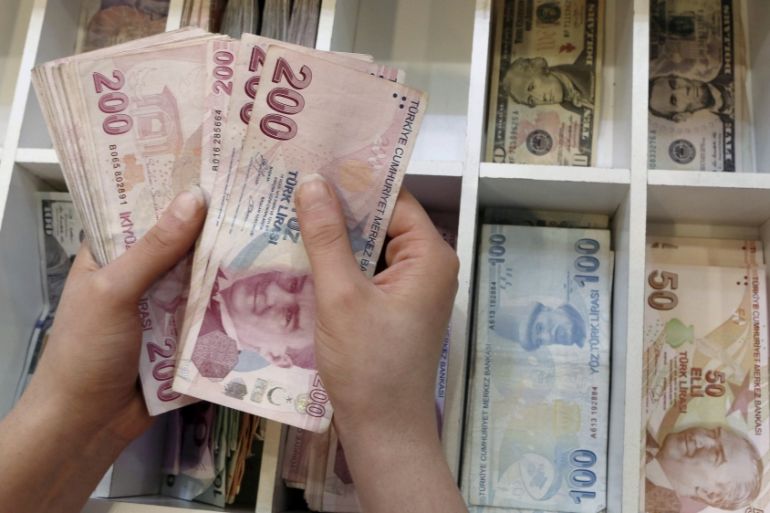After the coup attempt, Turkey stays on course
The fatal incident’s negative impact on Turkey’s financial markets has been limited and short-lived.

On July 15, a rogue group within Turkey’s military attempted to overthrow the democratically elected government, suspend the constitution and impose martial law.
Over the course of several hours, the coup plotters attacked the parliament, the presidential palace and strategic buildings, including the intelligence and police headquarters.
Keep reading
list of 4 items‘We need you’: Solomon Islands’ support for US agency’s return revealed
Why are nations racing to buy weapons?
Parallel economy: How Russia is defying the West’s boycott
Turkish President Recep Tayyip Erdogan barely escaped an assassination attempt, while several high-ranking officials were held captive.
Upon receiving news of the coup attempt and hearing the president’s call to resist, millions of ordinary citizens took to the streets and risked their lives to defend democracy.
Thanks to their sacrifice and the resilience of Turkey’s democratic institutions, the situation quickly de-escalated and the authorities launched a formal investigation to identify and bring to justice the perpetrators.
According to initial evidence and testimonies, the coup attempt, which claimed 238 casualties, was orchestrated by FETO, a terrorist group led by retired imam Fethullah Gulen.
The group, which started infiltrating civilian and military institutions in the late 1980s, has tens of thousands of operatives placed in the military, the judiciary and various government agencies.
To address imminent risks and hold accountable those responsible for the assault, the Turkish government, on the recommendation of civilian and military leaders, declared a three-month state of emergency – which has had zero influence on daily life.
Had the July 15 coup attempt taken place in any other developing nation, the consequences would have been catastrophic.
But Turkey’s strong fundamentals made it possible for us to overcome this challenge with relative ease.
Solid capital markets
Today, the economy remains stable, the banking system robust and the investment climate advantageous as ever.
The fatal incident’s negative impact on Turkey’s financial markets has been limited and short-lived.
By August 1, the country’s stocks and bonds had rallied to two-week highs and already recouped more than half of the losses sustained since the coup attempt.
As individuals with links to the coup attempt are brought to justice, Turkey's democratic institutions will become stronger and the decision-making process will become more transparent and investor-friendly.
While there was only an insignificant increase in the interest rate on 10-year bonds, the net capital inflow between July 1 and July 22 amounted to $533m.
There has been no notable decrease in bank deposits, no significant increase in credit demand, and no restrictions on capital movements.
Fluctuations in credit default swap (CDS) and the exchange rate have also been limited. On August 2, CDS stood at 266 while the Turkish lira was trading at 2.99 against the US dollar.
OPINION: In Turkey, democratic transparency defeats esoterism
To put things in perspective, CDS was 329 and the $/TRY rate had reached 3.06 amid the turmoil caused by FED’s signal to increase the federal funds rate in September 2015.
Keeping in mind that S&P cut Turkey’s credit rating over “growing political fragmentation and polarisation”, it is important to keep in mind that reconciliatory steps being taken by various political parties, coupled with strong economic performance, we are confident that they will reverse their decision.
Investor-friendly environment
Having handled the coup attempt in a professional and confident manner, Turkey’s central bank deserves some credit as well.
In the wake of the assault against Turkish democracy, the central bank provided liquidity to the markets to limit capital outflows and restore confidence of investors in the Turkish lira and Turkey’s economy.
OPINION: Coups work only for autocracies, not democracies
By passing a bill to improve the investment environment, the Turkish parliament has been contributing to recovery.
Meanwhile, the government sponsored a bill on August 2 to introduce automatic enrollment to the private pension system, which will significantly increase Turkey’s domestic savings rate.
Moving forward, Turkey is committed to take all necessary steps and implement reforms to meet growth, inflation, unemployment and current account deficit targets outlined in the medium term programme for 2016-2018.

While Turkey overcame a serious challenge on July 15, this is the right time for investors to come on board.
Major investments, including the construction of Turkey’s largest airport in Istanbul, continue as planned.
As individuals with links to the coup attempt are brought to justice, Turkey’s democratic institutions will become stronger and the decision-making process will become more transparent and investor-friendly.
Finally, we encourage investors to visit Turkey and meet policymakers to find out more about our plans for the future.
Lutfi Elvan is the minister of development of Turkey.
The views expressed in this article are the author’s own and do not necessarily reflect Al Jazeera’s editorial policy.
